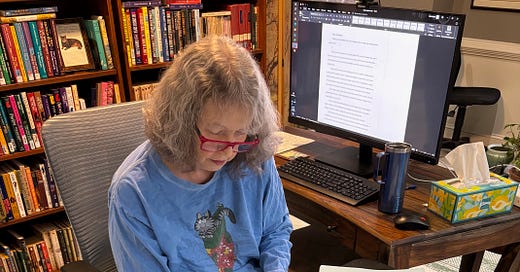You need to begin your nonfiction book the right way.
You need to start with knowing your audience, your message, and your teaching points or takeaways.
I didn’t.
I started my book with a healing draft about my days teaching economics. That healing draft ended with me ranting about the end of my teaching career. I wrote this in a community that was big on accountability, but didn’t have set times to write together.
It was painful. I had been severely depressed for three years, after I became disabled. Nothing wrong with getting that out of the way.
But it was time to move on.
I needed to do more if I was going to write a book.
I needed a community that had set times to write together.
I didn’t have a place to write
When I taught at Clayton State, I had a place to go to work. And, I got into the habit of showing up three times a week when I could, even I didn’t have to.
I’m the first to admit that I’m not disciplined.
Sometime in 2021, I started taking advantage of another community, Bookcamp, to try to write more often—to develop a writing habit.
Then in January 2022, someone at Bookcamp told me, “I just don’t get inflation.” I said, “I can explain that!” So, I had the first glimmer of my audience. And an inspiration for the book I had to write.
But it took me another year to find the right place to write that book. I started going to what sprints I could on BookCamp. It took a while to get into the habit of writing every day.
I needed to find a place to write everyday, just as I needed to go to school three times a week to get my teaching and academic activities taken care of. And I needed to find a time to meet that suited my swing-shift biological clock. 1
That came from a BookCamp lead to AJ Harper and her wonderful book: Write a Must Read. I joined the community in weekday writing sprints in November 2022. At 4pm every weekday I showed up, and still do, to write. And by January 31, 2023, I had 35,000 words and a rough draft.
I sent it off to some friends to read to gauge their reaction. I got a lot of helpful comments. And everyone thought it was worth pursuing further.
And in April 2023, I sent it off to an editor, Melissa Haskins, who specializes in dissertations on economics and related topics. She went through the book, made all kinds of useful comments, and pronounced it worthy of more work. I’m still working through some of my edits, now that I’ve made some much-needed changes to what the book actually would be.
And all of that was helpful. No one said, hang up your pen, Nikki, your writing is terrible.
That was a good thing because it kept me going.
Except that this isn’t how you write nonfiction well. It’s not how you reach the readers you think you can help.
I was still working backwards
I wrote pieces that eventually turned the bits I’d written before into a book.
The book, tentatively titled Bumps in the Road, was far from ready. I was using a college textbook outline, but this isn’t what I wanted to write. I wanted to write a book like Naked Economics by Charles Wheelan.
You see, I skipped all the steps, audience, message, and teaching points, except for one. I knew who I was writing for—those who skipped, forgot, or hated economics in school. Readers like the students I taught.
These are some of them. The woman who spent every evening for a semester eating dinner while listening to my online whiteboard presentations. The man who needed his Bachelor’s to get beyond a degree ceiling at work. The ones who didn’t want to learn economics at all but wanted better-than-passing grades.
A marketing professor once handed me a rare compliment. She said, “your students really get pricing.”
My reply: “I beat supply and demand into their heads all semester.”
Learn to walk before you run. And practice, practice, practice, a la Maria Montessori. I developed a practice-teach-practice system for my classes.
By the end of the semester my students, the ones who tried, could take an ordinary supply and demand graph turn in into a six-graph model of the economy when the government and the Federal Reserve work in concert to solve a problem.
But that doesn’t translate into a book. Much less a well-crafted one.
On Thursday, I’ll share more about how I didn’t write my book right.
Best,
Nikki
PS: I’m out of town starting Wednesday.
I worked the 4-midnight shift most of my life.





